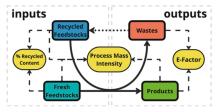Rapid Communication: Relating Sustainability Metrics to Evaluate Circularity and Material Efficiency
The rapid communication explores how to collect mass balance data (reagent amounts, products, waste) to generate metrics to evaluate material circularity and efficiency for chemical transformations. It explores the relationships between three simple metrics (process mass intensity, e-factor, and recycled content) to explore transformations holistically. There is a short case study exploring how these are applied to evaluate and compare different processes.
